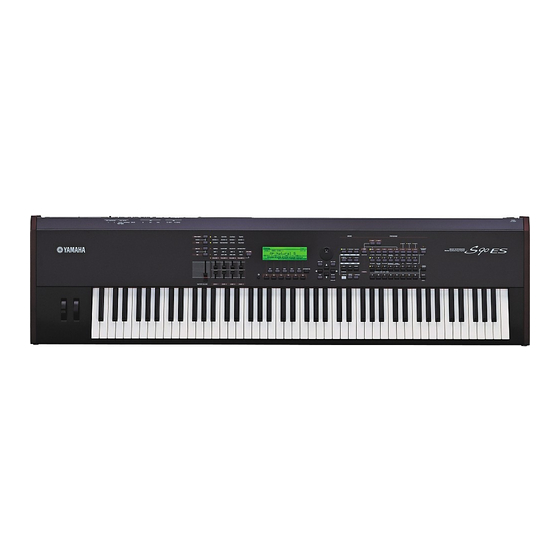Yamaha S90 ES Manuale breve - Pagina 2
Sfoglia online o scarica il pdf Manuale breve per Strumento musicale Yamaha S90 ES. Yamaha S90 ES 11. Half damper function and damper resonance effect
Anche per Yamaha S90 ES: Manuale di avvio rapido (4 pagine)

Assigning Controllers in Voice Mode
Within the architecture of each internal AWM2
(sampled-based) Voice is a set of 6 controller
assignment setups, called Control Sets. You can
program how the physical controllers will be
assigned to affect a specific part of the sound. The
assignable physical controllers available in the
Control Sets are:
MW – Modulation wheel
PB – Pitch bend wheel
AT - Aftertouch
FC1 – Foot Controller 1 (optional FC7 pedal)
FC2 – Foot Controller 2 (optional FC7 pedal)
FS – Foot Switch (optional FC4 or FC5 pedal)
Assign 1 – Slider
Assign 2 – Slider
BC – Breath Controller (optional BC3a)
RB – Ribbon Controller (*)
* The S90 ES does not have a Ribbon Controller.
However, keep in mind that if the same MIDI Control
Change messages as set here are received from an
external
device,
the
internal
responds to those messages as if the Ribbon Controller
of
the
instrument
was
programmed for the Motif ES, for example, might have
RB (cc22) assigned – the S90 ES Voice can still respond
to these in sequence data or via MIDI.
What about the Assign A and B Control Sliders?
ASSIGN A and ASSIGN B Control Sliders do not
appear in the individual Voice mode Control Sets.
Both are each assignable for the entire S90 ES
(global) and will behave the same in all Programs.
This is different from Assign 1 and Assign 2,
where
the
"destination
programmable, per Voice.
What about the Sustain pedal and the new Half-
damper and the Damper Resonance functions?
This will be the subject of a separate article. But,
in general, the Half-Damper function is part of
the VOICE mode Amplitude Envelope Generator
on a per Element basis and is tied to the FC3
(optional)
sustain
pedal;
Resonance, which simulates the soundboard
resonance inside a piano when the sustain pedal is
pressed, is a special Insertion Effect controllable
via the sustain pedal.
Control Set Conventions:
Certain Control Set assignments are common to
all elements and others can be specific to a
particular element of the sound. There are 6
Control Sets, each allows the user to pick a
physical controller and assign it a parameter
destination (the target parameter you will be
changing). It is possible with this system to assign
more than one controller to the same destination
tone
generator
also
used.
Voices
that
were
parameter"
while
the
Damper
by using more than one CONTROL SET. And it is
also possible to have a single destination under
the control of more than one physical controller.
The degree or depth of the control of each
physical controller can be programmed, as well. In
fact, the Depth parameter is very important –
because without a Depth amount the assignment
is meaningless. Think about the Depth setting as
controlling how far the controller will be moved to
get
the
response
performing gesture and should be set to your
particular taste and playing style. It is okay to
have an opinion about 'how much' you move a
controller to get the response you need.
You can view and set the parameters for the
Controller Setups in the S90 ES itself or via the
"Voice Editor for S90 ES" in your computer.
To navigate to the Controller Sets in the S90 ES
from Voice mode:
•
Press [EDIT]
•
Press [COMMON] (a/k/a Drum Kits/Favorites)
•
Press [F4] CTL Set
•
There are 6 sets
is
[SF1]-[SF3] buttons
•
Setting the SOURCE/DEST: select a Source
controller and assign a target Destination
(Dest) parameter.
•
Destination Elements or Common: The
'ElementSw' (or Element Switch) activates
control for each element. If the destination is
'common'
parenthesis (----) around the four dashes that
represent the individual elements. Parenthesis
around a parameter means you cannot get at
it (This is the equivalent of being 'grayed-
out'). In this case because all Elements will be
treated together. The Common parameter
destinations are Volume, Reverb Send or
Chorus Send. If, however, the destination can
be assigned to a specific Element(s) you will
see the destination parameter name as ELM-
Lvl = Element level, ELM-Dly = Element
delay, or ELM-Pan, etc. You can select which
elements are to respond to this control
setting. An "ElementSw" Element Switch
setting of "-2--", represents a setting where
2
you
wish.
This
(3 pair) selectable via the
to
all
elements
you
is
your
will
see
